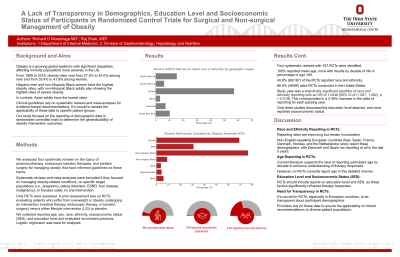Sunday Poster Session
Category: Obesity
P1443 - A Lack of Transparency in Demographics, Education Level and Socioeconomic Status of Participants in Randomized Control Trials for Surgical and Non-surgical Management of Obesity
Sunday, October 27, 2024
3:30 PM - 7:00 PM ET
Location: Exhibit Hall E

Has Audio
.jpg)
Richard Maradiaga, MD
The Ohio State University Wexner Medical Center
Columbus, OH
Presenting Author(s)
Richard Maradiaga, MD, Raj Shah, MD
The Ohio State University Wexner Medical Center, Columbus, OH
Introduction: Obesity is a worsening epidemic marked by significant health disparities disproportionately affecting minority populations in the United States. Clinical guidelines use systematic reviews and meta-analyses to provide practitioners with evidence-based data; however, it is important to know if the data informing recommendations is applicable to a provider’s patient. We aimed to assess the reporting of demographic data in randomized controlled trials (RCTs) to help providers determine the generalizability of outcomes.
Methods: <strong>We assessed 4 systematic reviews on the topics of pharmacotherapy, endoscopic bariatric therapies, and bariatric surgery for managing obesity that have informed guidelines on these topics. Only RCTs were assessed. We collected reported age, sex, race, ethnicity, socioeconomic status (SES), and education level and evaluated recruitment practices. Logistic regression </strong>was used for analyses.
Results: We identified 167 RCTs. Four trials did not report sex proportions. All RCTs reported mean age, but none reported participants per decade of life or percentage of age >65. 40.8%(69/167) of the RCTs reported race and ethnicity. Of these, 66.6% (46/69) were RCTs conducted at least partially in the United States. Of the 98 RCTs that did not report these demographics, 14% were conducted in North America, 5% in South America, 56% in Europe, 4% in Africa, 7% in Australia, and 4% in South-East Asia. There was a statistically significant positive trend in race and ethnicity reporting overtime (p = 0.019) with an OR = 1.0438, 95% CI [0.007, 0.079], for every year. Of the total RCTs, the first RCT to report race or ethnicity was published in 1974 with the subsequent 11 RCTs not mentioning these demographics until 1998. Of these, 7 were conducted in the United States. Overall, 3 studies discussed the education level attained, and 3 reported socioeconomic status.
Discussion: More than half of the RCTs did not report race or ethnicity though rates of reporting seem to be improving slowly over time. Non-English-speaking European countries have the most trials without transparency in race or ethnicity, some notably failing to report demographics within the last five years. RCTs should report education level and SES as these variables may help understanding therapy response. Trialist need to be transparent about the included population characteristics, as providers depend on these data to ensure the applicability of recommendations for their patients.
Disclosures:
Richard Maradiaga, MD, Raj Shah, MD. P1443 - A Lack of Transparency in Demographics, Education Level and Socioeconomic Status of Participants in Randomized Control Trials for Surgical and Non-surgical Management of Obesity, ACG 2024 Annual Scientific Meeting Abstracts. Philadelphia, PA: American College of Gastroenterology.
The Ohio State University Wexner Medical Center, Columbus, OH
Introduction: Obesity is a worsening epidemic marked by significant health disparities disproportionately affecting minority populations in the United States. Clinical guidelines use systematic reviews and meta-analyses to provide practitioners with evidence-based data; however, it is important to know if the data informing recommendations is applicable to a provider’s patient. We aimed to assess the reporting of demographic data in randomized controlled trials (RCTs) to help providers determine the generalizability of outcomes.
Methods: <strong>We assessed 4 systematic reviews on the topics of pharmacotherapy, endoscopic bariatric therapies, and bariatric surgery for managing obesity that have informed guidelines on these topics. Only RCTs were assessed. We collected reported age, sex, race, ethnicity, socioeconomic status (SES), and education level and evaluated recruitment practices. Logistic regression </strong>was used for analyses.
Results: We identified 167 RCTs. Four trials did not report sex proportions. All RCTs reported mean age, but none reported participants per decade of life or percentage of age >65. 40.8%(69/167) of the RCTs reported race and ethnicity. Of these, 66.6% (46/69) were RCTs conducted at least partially in the United States. Of the 98 RCTs that did not report these demographics, 14% were conducted in North America, 5% in South America, 56% in Europe, 4% in Africa, 7% in Australia, and 4% in South-East Asia. There was a statistically significant positive trend in race and ethnicity reporting overtime (p = 0.019) with an OR = 1.0438, 95% CI [0.007, 0.079], for every year. Of the total RCTs, the first RCT to report race or ethnicity was published in 1974 with the subsequent 11 RCTs not mentioning these demographics until 1998. Of these, 7 were conducted in the United States. Overall, 3 studies discussed the education level attained, and 3 reported socioeconomic status.
Discussion: More than half of the RCTs did not report race or ethnicity though rates of reporting seem to be improving slowly over time. Non-English-speaking European countries have the most trials without transparency in race or ethnicity, some notably failing to report demographics within the last five years. RCTs should report education level and SES as these variables may help understanding therapy response. Trialist need to be transparent about the included population characteristics, as providers depend on these data to ensure the applicability of recommendations for their patients.
Disclosures:
Richard Maradiaga indicated no relevant financial relationships.
Raj Shah indicated no relevant financial relationships.
Richard Maradiaga, MD, Raj Shah, MD. P1443 - A Lack of Transparency in Demographics, Education Level and Socioeconomic Status of Participants in Randomized Control Trials for Surgical and Non-surgical Management of Obesity, ACG 2024 Annual Scientific Meeting Abstracts. Philadelphia, PA: American College of Gastroenterology.
